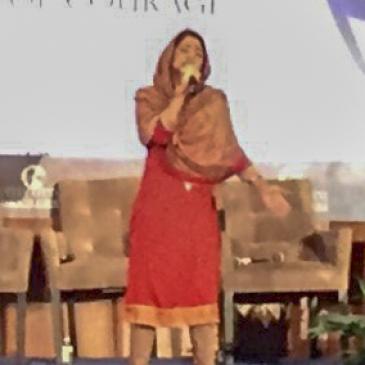Liya Kebede

Harnessing her fame as a supermodel, and drawing on her experiences as a child in Ethiopia and as a mother in the United States, Liya Kebede has become a leading advocate for maternal, newborn, and child health around the world. A social entrepreneur, Kebede uses her clothing company lemlem to promote both economic opportunities and access to reproductive healthcare for women in Ethiopia.
Liya Kebede was born in Addis Ababa, Ethiopia in 1978. Her mother worked in public relations and her father worked as a manager for Ethiopian Airlines. Kebede was the fourth of five children and the only daughter. Kebede loved to read and learned to speak French and English fluently. She attended the Lycée Guebre-Mariam, and considered careers in journalism and teaching or becoming a flight attendant. But first, Kebede decided to explore her opportunities as an aspiring model.
At 18, Kebede moved to Paris and then the United States in pursuit of her modeling career. She lived with her brothers in Chicago before marrying Ethiopian hedge fund manager Kassy Kebede and moving to New York. In 2000, Kebede landed an exclusive deal modeling for designer Tom Ford at Gucci. At the same time, Kebede became pregnant with her son, Suhul. Though marriage and motherhood are not common among active fashion models (“In those days, no one, no one, got pregnant,” she told one reporter), Kebede claims her family anchored her amid modeling’s fast-paced lifestyle and shielded her from the loneliness of the job. Just a year after her son’s birth, Kebede was not only the cover model but the main focus of an entire issue of Vogue Paris. Soon, she became Estee Lauder’s first Black spokesmodel. She has modeled for countless iconic fashion brands, such as Christian Dior, Dolce & Gabanna, Louis Vuitton, and Yves Saint-Laurent, as well as popular companies like Gap, J.Crew, and Victoria’s Secret.
In 2005, Kebede became a World Health Organization (WHO) goodwill ambassador for maternal, newborn, and child health. That same year, she had her second child, a daughter named Raee. During her first pregnancy, Kebede feared she wouldn’t survive childbirth. In her native Ethiopia there is a common refrain that “to be pregnant is to have one foot in the grave.” As late as 2018, 162,000 mothers across Africa died each year from complications of childbirth. Kebede seized the opportunity to work with the WHO to raise awareness about maternal health disparities across the world and to take part in efforts to make childbirth safer for mothers everywhere. In 2009, Kebede addressed the United Nations’ Secretary-Generals Forum on Advancing Global Health in the Face of Crisis. She briefed the forum on the data regarding maternal and child health in the developing world and shared her own perspective, noting the stark contrast between growing up in Ethiopia, where dying from childbirth was a common occurrence, to giving birth in the United States, where she had access to the most advanced medical care.
In 2007, Kebede created her clothing line, lemlem, in an effort to promote the artisanal handweaving craft of Ethiopia. The technique had previously been part of a thriving clothing industry, but as imported items like jeans and t-shirts replaced habesha kemis (long and loose white dresses with bright woven trims), the artisanal style declined in popularity. Kebede had no experience in business, but was compelled to help and determined to figure it out along the way. Kebede put sustainability and social good at the center of her company from the start, making her one of the early entrants into the field of social entrepreneurship. lemlem, which means “to bloom” and “flourish” in Amharic, creates jobs by employing weavers and offers a new spin on the craft by featuring more contemporary designs. Kebede told Forbes in 2018: “For me, sustainability is when you employ someone so they can earn their own money and support their families. Our artisans have regular salaries which empower them to send their kids to school, get healthcare and build better lives for their families. The company's entire purpose is to uplift artisans. It’s why we do what we do.” lemlem began with children’s clothing but has expanded to include adult apparel and swimwear, releasing three collections each year. It is available in 150 retailers across the world. The company has grown from employing 30 artisans to over 250 and their wages have risen fivefold.
Kebede’s work on behalf of maternal health continues through lemlem’s foundation. The foundation works with aid organizations across Africa to increase access to pre- and post-natal care and education. In 2011, the foundation opened a maternity center in Hawassa, Ethiopia, that quickly and dramatically improved outcomes for mothers and babies there. It also seeks to educate the next generation of women about reproductive and maternal health, partnering with the International Leadership Academy of Ethiopia in a peer-to-peer campaign that helps teen girls support and educate each other. Additionally, as the art of handweaving was traditionally passed down from father to son, lemlem offers training to women so that they can learn the craft and market their skills.
Kebede has also acted in several films, with her most notable role aiding her mission to spread awareness about the challenges women face across the globe. She was the lead in 2009's Desert Flower, a film based on the life of Somalian model and female genital mutilation survivor and spokesperson Waris Dirie. Kebede continues to model, but her philanthropic efforts and advocacy work are her main focus. In 2010, Kebede was named one of Time Magazine’s 100 Most Influential People, and in 2013 she was named one of Glamour Magazine’s Women of the Year.
Reflecting on career path from modeling to advocacy and entrepreneurship, Kebede stated: “Everything meaningful comes with daunting questions and obstacles...Don’t let the fear of the unknown stop you from pursuing something you believe in. The answers you’re looking for will reveal themselves. You just have to get started.”
Abdou, Jenna. “How International Model Liya Kebede Harnesses Her Work To Fuel Social Good.” Forbes. April 16, 2018. Accessed Feb. 12, 2021. https://www.forbes.com/sites/jennaabdou/2018/04/16/how-international-model-liya-kebede-harnesses-her-work-to-fuel-social-good/?sh=30109a681f66
Ballentine, Sandra. “Liya Kebede On How to Raise a Global Citizen.” Condé Nast Traveler. Aug. 19, 2014. Accessed Feb. 12, 2021. https://www.cntraveler.com/stories/2014-08-19/liya-kebede-on-philanthropy-and-parenting
Cavanaugh, Alice. “The unstoppable Liya Kebede and her ethical brand Lemlem.” Financial Times. Dec. 6, 2019. Accessed Feb. 12, 2021. https://www.ft.com/content/c39dc2aa-44da-40a1-b6c4-8f262900e1bc
Chew-Bose, Durga. “The Staying Power of Liya Kebede.” Harper’s Bazaar. Oct. 20, 2020. Accessed Feb. 12, 2021. https://www.harpersbazaar.com/culture/features/a34398326/liya-kebede-november-2020/
“lemlem: Our Story.” lemlem: By Liya Kebede. Accessed Feb. 12, 2021. https://www.lemlem.com/pages/our-story
“Liya Kebede: Biography.” The Business of Fashion. Accessed Feb. 12, 2021. https://www.businessoffashion.com/community/people/liya-kebede
MLA – Brandman, Mariana. “Liya Kebede.” National Women’s History Museum, 2021. Date accessed.
Chicago – Brandman, Mariana. “Liya Kebede.” National Women’s History Museum. 2021. www.womenshistory.org/education-resources/biographies/liya-kebede
Image Credit: "File:Liya Kebede 66ème Festival de Venise (Mostra) 2.jpg" by nicolas genin from Paris, France is licensed with CC BY-SA 2.0.
Kebede, Liya. “Let's Make Mother's Day a Global Reality.” HuffPost. June 7, 2009. https://www.huffpost.com/entry/lets-make-mothers-day-a-g_b_199119
“Supermodel Liya Kebede on Protecting Vulnerable Populations.” United Nations Population Fund. June 17, 2009. https://www.unfpa.org/pcm/node/8745







